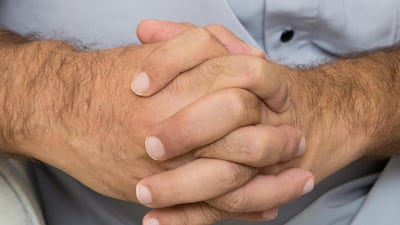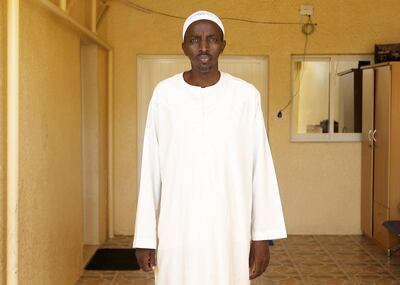Since the launch of weekly Helping Hands series in October 2015, readers of The National have donated Dh2 million dirhams, changing the lives of UAE residents in distress.
Our readers have helped more than a hundred people from different nationalities with one thing in common – they had fallen on bad times, facing sickness, debt, deportation and sometimes death because of a lack of personal funds. And on top of that, hospitals and medical centres have been in touch to donate vital medical treatments.
For three years, The National has collaborated with Dubai charity Dar Al Ber to publish the cases of residents in dire need of financial assistance. The partnership is of particular significance because under UAE law it is prohibited to raise funds or ask for donations without a permit. Helping Hands donations go directly to Dar Al Ber, which uses the money to pay off debts or medical bills.
Yet there are still hundreds, even thousands, of residents who need help, especially those without health insurance. Hisham Al Zahrani, the manager of zakat and social services at Dar Al Ber Society, said that this is the cause of the problems for most of the cases they see.
"Many living in the Northern Emirates in particular don’t have health insurance and those who do often have limited coverage,” he said.
We have published in particular the stories of dozens of residents who cannot afford dialysis, which can cost up to Dh1,500 a session. Typically, a patient will require it two or three times a week while waiting for a kidney transplant, which can take years.
From the beginning
The National's first case was published on October 24, 2015. It told the story of a Sudanese couple who could not afford the medical treatment of their newborn, with a bill that had hit Dh240,000. Father Ahmed Yousif risked jail and deportation.
“We tried to delay the delivery as much as we could so the baby could survive,” said Mr Yousif at the time. “But [my wife] delivered a few days later.”
The baby was placed in an intensive-care incubator for three months. By the time he was discharged, the family’s hospital bill had spiralled.
“My wife’s health insurance didn’t cover maternity,” Mr Yousif said. “I paid additional for it to include maternity. Unfortunately, her health insurance came into effect right after she delivered. We had no idea that she would have the baby early”.
Mr Yousif had to give the hospital blank cheques to release his son.
“I couldn’t sleep at night,” he said. “I had no way of paying the amount back, which meant that I could go to jail and we would be deported.”
Mr Yousif had spent his entire life in the UAE and had no connections to Sudan.
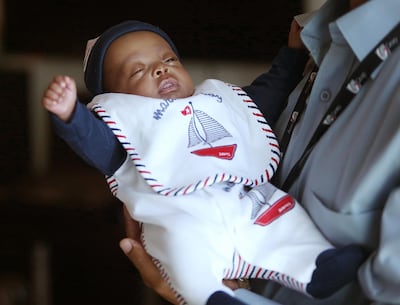
Whether it was the newborn's precious picture that moved so many to immediately provide assistance or the a deep empathy with what it's like to be desperate is hard to say, but to Mr Al Zahrani this was "naturally one of the most memorable cases".
As soon as the article was published, donations poured in from readers, and the entire hospital bill was soon cleared. "We expected this because of the kindness of the community – they wouldn't let our family suffer," said Mr Yousif. "Thank God and The National and Dar Al Ber and every person who helped us through these difficult times."
“Yes, we were worried and we don’t know what we do,” his wife said. “But I knew deep down that when people read about our case then they would definitely help.”
“It was exhilarating and heart-warming to see such generosity,” said Mr Al Zahrani. “Complete strangers and sometimes companies were calling us and asking how they could help.”
'This is all I wanted'
One Helping Hands case found a donor in his daughter and is currently undergoing the necessary tests to undergo the transplant at Sheikh Khalifa Medical City in Abu Dhabi.
We published the case of 45-year-old Zakareya Taher in 2016. Mr Taher was diagnosed with kidney failure more than a year beforehand and had lost his job as a result.
"I go three times a week for dialysis for four hours and I'm always tired. No job would put up with that," the father of four said.
While his employer assured his employment visa was in order, Mr Taher had no insurance and no income. His dialysis sessions were costly and going back to his home country was not an option.
"I can't go back home for dialysis or a transplant because it's not available. We live more than 2,000 kilometres from Addis Ababa," Mr Taher says.
Mr Taher had to pay Dh9,000 for dialysis every month. He asked for help to pay for up to six months of dialysis until his operation. He also owed the hospital Dh3,000.
Reader’s donations helped pay off his hospital bill and a few months of dialysis.
"This is all I wanted, Thank God," he said. "Any time now, I will do the transplant and no longer need dialysis or be depend on charity," he said. "I can stand on my own two feet and will not be a burden on anyone."
Another life saved
More recently was the case of newly-wed Filipina Jackielyn Quiasmbao. She was undergoing four-hour dialysis sessions three times a week until she discovered her medical insurance plan did not cover her.
“My insurance covered the first three sessions and then stopped paying for it,” she said. One of her sessions of dialysis cost Dh653 and Ms Quiasmbao earned only Dh3,000 a month.
“Dialysis will cost more than Dh7,000 [a month], which is more than double my salary,” she said.
Ms Quiasmbao was on the waiting list at SKMC for a kidney transplant and in the meantime had to be on dialysis otherwise she could die.
“I cant afford to continue paying for dialysis. I’ve taken all the loans that I can but it is too expensive for us,” Jackielyn said at the time.
After reading about her case, she was contacted by a health centre that offered her free dialysis sessions at her home, which offered Ms Quiasmbao her life back.
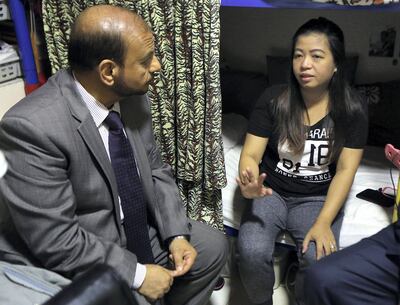
"The ability to have control of your life again not only creates a healthier state of mind but also takes the burden off family members that have to support you when travelling to a dialysis unit three times a week. We hope that Jackielyn will benefit from our service and that her transplant will be successful in the next two months. Inshallah," a home care dialysis company said.
Ms Quiasmbao had her first dialysis session at her home last week. "I am so happy and so grateful," she said. "This is much easier for me and now I am just awaiting the transplant and no longer have to worry about how I will pay for my next dialysis session."
Some of the cases are contacted by government hospitals and private health centres who will provide the procedures for free, said Mr Al Zahrani.
A family reunited
Readers' donations also helped Mohammad Mohsin send his family back home to Pakistan. We published his case in November 2016, and at the time, Mr Mohsin had lost his job as a taxi driver and had decided to take his family back home to Pakistan.
His wife, however, had given birth to their third daughter, Hooria, in the UAE, and he now had a large medical bill to pay.
“My wife had a Caesarean and because we had no health insurance, the operation cost Dh20,000,” Mr Mohsin, 31, said. He was unemployed and could not pay the amount due.
“The hospital refused to give me a birth certificate unless I paid all the money,” he said.
When we interviewed him at the time, he had been unemployed for more than a year and was illegally residing in Dubai. His children also had no legal status in the country. His biggest obstacle, however, to returning home was the hospital fees.
“Without a birth certificate, I can’t get my daughter a passport so we can all travel back home. My two other daughters have passports, but passports without a valid residency visa is a problem and [we are] illegal.”
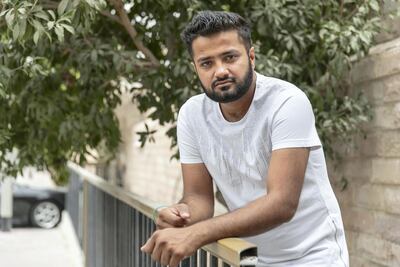
His daughter was 7 and had not yet started school. “To go to school she needs to have a residency visa and she doesn’t have one,” he said. “We also have no health insurance, so we are always worried when someone gets sick.”
Mr Mohsin and his wife were hoping for the day when they and their daughters will be back in Pakistan.
“I can’t afford to keep them here and I want my daughters to go to school. It’s unfair to keep them here,” he said. “In Pakistan, my parents and brothers and sisters are there. They are waiting for us.”
Today, after Helping Hands and reader donations, Mr Mohsin’s family are back home in Pakistan.
“I am still here in Dubai looking for a job, but I feel better knowing that my family are back home,” he said. “Without the assistance I received, I would never have been able to do that.”
And we're still just getting started
Not all cases receive such healthy responses, though, and some do not receive any support, which Mr Al Zahrani said is "the saddest part of our job".
“We are not sure why some cases receive help and why others don’t. In our eyes, everyone deserves assistance,” Mr Al Zahrani said.
Helping Hands cases will continue to be published every week, trying to help those most in need. "We hope readers know what a huge life-saving difference their donations make," Mr Al Zahrani said.
